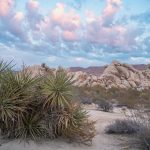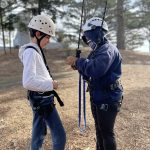 We are fortunate to include Peter Flom as a member of our talented instructor team here at Outward Bound California. Peter went on course in 2014 as part of the Outward Bound Veterans Program. During his backpacking course in the High Sierra, Peter was exposed to the experiential model of Outward Bound and felt a special bond with his crewmates, all veterans and active military service members. Since then, he has completed college, his military service, and has been hired as an instructor with OBCA.
We are fortunate to include Peter Flom as a member of our talented instructor team here at Outward Bound California. Peter went on course in 2014 as part of the Outward Bound Veterans Program. During his backpacking course in the High Sierra, Peter was exposed to the experiential model of Outward Bound and felt a special bond with his crewmates, all veterans and active military service members. Since then, he has completed college, his military service, and has been hired as an instructor with OBCA.
Now, Peter is working with YES Nature to Neighborhoods, who, with the generosity of the Save the Redwoods League, spent three days backpacking and learning among the Redwoods in Pescadero Creek Park this April. In the interview below, Peter shares what it was like to go from student to instructor and how Outward Bound California has shaped him.
Outward Bound California: Let’s start from the beginning. Where are you from?
Peter Flom: I grew up on a small farm in rural Wisconsin. I used to go into the woods when I was upset or needed to think, and have always found peace in the outdoors. My teenage years were turbulent to say the least, and I ended up living in strict behavior modification facilities in Nevada and Montana, where I found the mountains to be more restorative than any of the seminars or therapy I underwent. This experience ignited my passion for youth work, and helped me realize that life’s difficulties are necessary to develop resilience, empathy, and knowledge of self. I joined the Army right after I turned 18, and completed my contract while living in Minneapolis and studying Youth Studies at the University of Minnesota.
OBCA: And now you work with youth at Yes Nature to Neighborhoods in Richmond! Can you tell me about a student of yours who triumphed?
PF: Most of the students I have gone on course with have felt the sense of accomplishment that comes with completing something that was really difficult, but one young lady stands out in my mind. The first time I went on a day hike with her, she was fearful of a lot of the unknowns of nature and had to be coaxed across a small stream. By the end of her High Sierra course, it was awesome to see how much her comfort zone had grown. She embraced solo time, was often the first person to walk through the icy cold streams, and her reactions to wildlife, dirt, and insects had shifted from fear to curiosity. This is a young lady who I interact with regularly through my work with YES Nature to Neighborhoods, and I know the triumph of achieving something that she totally thought was unachievable will benefit her as she continues to face the challenges of life in Richmond, high school and beyond.
OBCA: That is such an amazing transformation! Thank you for sharing. When did notice your students start to light up on course?
PF: On the last night of a High Sierra course, the students were feeling proud of themselves and each other, and spirits were high. The teens had worked together to plan out the timelines and navigation for the day, and had moved faster than they anticipated on their last long hike. We were eating our last dinner together as a group, and the jokes, laughter, and silliness were pervasive. They knew that the hard part was over, and the bus would be coming to take them back to Richmond the next morning. During dinner, a small herd of deer appeared and could be seen walking around in the woods outside the campsite and peering in at the happy family enjoying their spaghetti. It was a moment that exemplifies everything I have come to appreciate about OB courses. I believe there is a level of camaraderie that only emerges among people who have worked together to overcome the most difficult and challenging periods of their lives.
OBCA: When did you feel the most proud of yourself or your team?
PF: On the first day of my vets course, one of the other participants was being physically challenged to the full extent of their abilities. It was amazing to see the other members of the team step up immediately to provide support, take some of the weight, and continue providing positive encouragement without any griping on the side. We had only met each other a few hours before, but there was already a sense of solidarity and there was no way we were going to let one of us struggle without assistance.
OBCA: What lessons did you learn that you still use today?
 PF: One of the most surprising lessons I learned from my vets course was the importance of community. I went into the trip focusing primarily on the mountains, the landscape, the physical challenges, and my own issues. After a couple days, though, I found myself spending more and more time talking to the other veterans about our shared experiences. I rarely spend time with other vets in my daily life, and had forgotten how good it feels to be around people who understand and empathize with some of the struggles we often encounter when adjusting back into civilian life after living in a combat zone. I walked away from this trip knowing that connection and community engagement was missing from my life, and have been blessed to find a wonderful community that I care about here in Richmond, CA.
PF: One of the most surprising lessons I learned from my vets course was the importance of community. I went into the trip focusing primarily on the mountains, the landscape, the physical challenges, and my own issues. After a couple days, though, I found myself spending more and more time talking to the other veterans about our shared experiences. I rarely spend time with other vets in my daily life, and had forgotten how good it feels to be around people who understand and empathize with some of the struggles we often encounter when adjusting back into civilian life after living in a combat zone. I walked away from this trip knowing that connection and community engagement was missing from my life, and have been blessed to find a wonderful community that I care about here in Richmond, CA.
OBCA: What was your solo like when you were course as a student? What did you do?
PF: I consider my solo time on the High Sierra vets course to be a crucial moment in my life. It was about two years after I returned from Iraq, and I didn’t really like the person that I was at the time. I was about to graduate from college and get out of the army, and I had no idea what I was going to do with my life after that. I remember sitting by a cold, clear lake, and looking up at a mountain that we were going to summit the next day. I thought about everything I had been through, and how the next steps in my life were entirely in my control. I wrote myself a six month letter that day, but left the address line blank because I had no idea where I would be six months after the trip. That letter bounced around the country trying to find me for a while, and I thought it was lost for good. When I started working for Outward Bound California, I inquired as to the potential whereabouts of the letter, but it had been a year and a half since my trip and it seemed like there was a slim chance of finding it. Jason Schmidt, the Associate Program Director at OBCA, never gave up on the search, and delivered the letter to me by hand a few months ago. I am incredibly grateful for this commitment, and it was awesome to read some of the goals I set that day in the mountains. I have already accomplished many of the things I told myself to do in that letter, and can see now how far I have come since that period in my life.
 OBCA: How would you describe Outward Bound in a nutshell?
OBCA: How would you describe Outward Bound in a nutshell?
PF: I think the most important thing Outward Bound provides is mental fortitude, a fundamental character trait that many of us have lost in an age where discomfort is rare. OB courses creates an atmosphere where people can challenge themselves personally while being supported by a group of people who are doing the same. I appreciated this element of trips as a participant and instructor. Now, as a member of a partner agency who sends youth on OB courses every year, I encourage the young people who I know need to be shown their own strength to sign up for trips.
OBCA: Please describe what it is like to have so many connections to Outward Bound California? How does your experience help you in your job?
PF: Outward Bound California has come into my life at different times and has always provided me with new skills and perspectives that help me in my personal and professional development. My experience on the veteran’s course sparked my interest in outdoor education and the instructors showed me what a good trip leader looked like. When I started volunteering with OBCA, it became clear to me that the organization is absolutely filled with kind, passionate, motivated people who truly care about the populations they serve. I was honored to be hired as an assistant instructor, and learned a ton about leading trips from all of the experienced outdoor educators who work for OBCA. I lead a lot of outdoor excursions with my current job at YES, and frequently find myself referencing lessons or conducting activities I learned at OB. In the short time I have worked at YES, we have collaborated with OBCA on three trips. It has been super helpful for me to know and trust the people my teens will be working with, and it makes parents feel more comfortable to see the confidence I have in the integrity and ability of OBCA instructors..
OBCA: What’s next for you?
PF: I started working full time as the Youth Engagement Specialist at YES Nature to Neighborhoods in April, and hope to continue my journey there for the foreseeable future. I facilitate a teen research project, lead teen leadership workshops, and plan and execute hikes, bike rides, kayak trips, and more. Right now, I am excited to begin a new program at YES that will engage 11-13 year olds in a variety of outdoor adventures and environmental lessons. I love getting to develop close relationships with young people and support them in whatever way they need. I am glad that OBCA will still be a part of my life as I continue to send YES teens on trips and come along as a chaperone when I can.
Peter’s course was paid for by generous donors like you. If you want to make a donation to get someone like Peter on an Outward Bound California course, click here.











We, Colleen and I, are so grateful that God has brought Peter into our lives. She was along on the High Sierra Course. Outward Bound and YES are fabulous organizations. They are fortunate to have such a wonderful man working for them. We wish you a blessed journey and look forward to many more experiences together.